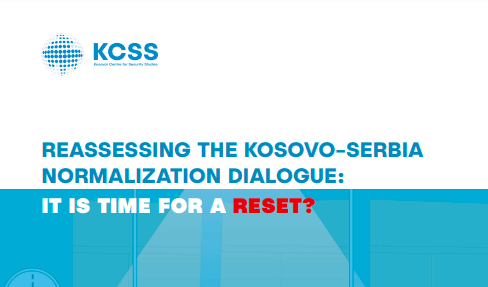8/08/2024

Prishtina, August 7, 2024 — The Kosovar Centre for Security Studies (KCSS) has an analytical report titled "Reassessing the Kosovo-Serbia Normalization Dialogue: Time for a Reset," authored by Dr. Ramadan Ilazi, head of research at KCSS. This report examines the EU-led dialogue process between Kosovo and Serbia, advocating for a reset to achieve sustainable resolution of the Kosovo-Serbia dispute, which risks draggint the entire region of the Western Balkans into instability if it persists. Affirmative change in the status-quo in Kosovo-Serbia relations is vital for stability in the region as well as for reducing or disrupting the potential for interethnic violence in Kosovo.
Since its start in 2011, the Kosovo-Serbia normalization dialogue has resulted in various agreements and efforts aimed at fostering better relations between the two countries. Despite these efforts and around 40 agreements reached between the parties, the process has faced numerous challenges and has not yet produced a comprehensive and legally binding normalization agreement that would affirmatively change the status-quo in Kosovo-Serbia relations.
Over the past decade, the normalization dialogue has primarily focused on managing disputes between Kosovo and Serbia rather than resolving them sustainably. The report critically analyzes these challenges and proposes a set of recommendations to enhance the dialogue's effectiveness.
Key Takeaways:
Dr. Ramadan Ilazi, head of research at KCSS, emphasized, "The normalization dialogue between Kosovo and Serbia requires a fundamental reset. The current approach has reached its limits, and it is essential that both parties, with the support of the EU, commit to a clear, structured, and transparent process. We must end the strategy of kicking the can down the road, and the EU must muster the necessary political will to change the status quo in Kosovo-Serbia relations in an affirmative manner. To do this, the EU must take a more assertive role, including in the implementation of reached agreements, and move beyond constructive ambiguity to provide clarity about the process and its end results.”
https://qkss.org/al/publikimet/rivleresimi-i-dialogut-te-normalizimit-kosove-serbi-eshte-koha-per-nje-rivendosje